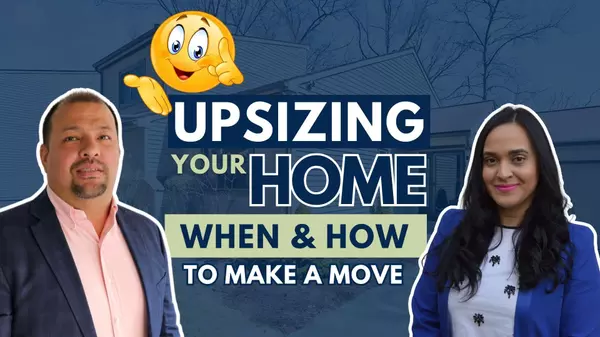
3 Reasons Why You Should List Your Home with Us
Are you considering selling your home? Whether you're moving to a new city, upgrading to a larger space, or downsizing for retirement, choosing the right real estate agent can make all the difference. Here at RxP Team | Real Broker LLC, we pride ourselves on our commitment to our clients and our city.Wondering why you should list your home with us? Here are three compelling reasons: Real Estate is Our Passion Let's be honest: we live and breathe real estate. Even when we're "off the clock," our minds are constantly buzzing with strategies to sell homes and make our clients happy. This obsession isn't just a job for us; it's a passion. When you list your home with us, you can trust that we'll stop at nothing to get it sold. Our dedication and drive ensure that we won't rest until you're 100% satisfied with the outcome. Your success is our top priority. We Love the City There's something special about our city, and we can't help but gush about it. We're not just selling homes; we're selling a lifestyle. When prospective buyers step through the door of your home, they won't just hear about its features – they'll hear about the vibrant community, the local hotspots, and why your neighborhood is the perfect place to call home. Our passion for the city shines through in every interaction, making your home all the more enticing to potential buyers. We've Got Seller Tricks Up Our Sleeves Experience is the best teacher, and after years in the real estate industry, we've picked up a few tricks of the trade. These seller hacks have consistently proven to catapult our clients' homes to the top of buyers' lists, and the best part? They hardly cost a thing. From staging tips to strategic pricing strategies, we know what works and how to make your home stand out in a crowded market. Ready to Take the Next Step? Reach out to us today to discuss listing your home in 2024. Whether you're just exploring your options or ready to make a move, we're here to help – no strings attached. Selling your home is a big decision, and we're committed to making the process as smooth and stress-free as possible. Get in touch with us today to schedule a consultation and discover how we can make your real estate goals a reality.

Co-op vs Condo: Making the Right Choice for Your Next Home
If you're looking to purchase a home in a metropolitan area, you may be considering either a cooperative (coop) or a condominium (condo). Both offer a similar living experience, but they have some significant differences that you need to consider before making your decision. Cooperative Housing: Cooperative housing, or a "coop," is a unique form of ownership where residents own shares in a corporation that owns the building. Rather than owning their unit, residents own a percentage of the corporation and are granted the right to occupy a specific unit. Here are some pros and cons to consider: Pros: Coops tend to be more affordable than condominiums, especially in high-cost areas like New York City. This is because coops often have stricter requirements for potential buyers, such as higher down payments and strict credit requirements. Coops also tend to have lower monthly carrying costs, as they share common costs across all the owners of the building. Maintenance fees include property taxes, shared area maintenance and utilities like heat, hot water, and sometimes electricity! Coops typically have a stronger sense of community, as the board has more control over who can purchase and occupy units. This can create a more cohesive living experience among owners. Cons: Coops tend to have more restrictions than condominiums, including limitations on subletting and renovations. Coops can also be more challenging to finance, as lenders may be hesitant to provide loans to potential buyers due to the unique ownership structure. The coop board has significant control over the building's operation. Condominiums: Condominiums, or condos, are individual units within a larger building or complex that are owned outright by the resident. When you buy a condo, you own the unit and have the right to use common areas and amenities. Here are some pros and cons to consider: Pros: Condos offer more flexibility when it comes to ownership, as you can rent or sell your unit without needing board approval, with some exceptions as you still need to abide by the by-laws of the offering plan. Condos tend to be easier to finance, as they are considered a more traditional form of ownership and are often more readily accepted by lenders. Condos often have fewer restrictions on renovations and modifications, giving you more freedom to personalize your living space. Cons: Condos can be more expensive than coops, especially in high-demand areas with limited inventory. Monthly carrying costs can be higher, as residents are responsible for their unit's property taxes and utilities in addition to maintenance fees. Condos may have a less exclusive living experience, as there are fewer restrictions on who can purchase units and occupy the building. In conclusion, the decision to buy a coop or condo depends on your personal preferences and financial situation. While coops may be more affordable and offer a stronger sense of community, they also come with more restrictions and a more challenging financing process. Condos offer more flexibility and fewer restrictions but may come with a higher price tag and less exclusivity. By weighing the pros and cons of each option, you can make an informed decision about which type of ownership is right for you.

Selling Your House? Your Asking Price Matters More Now Than Ever
There’s no doubt about the fact that the housing market is slowing from the frenzy we saw over the past two years. But what does that mean for you if you’re thinking of selling your house?While home prices are still appreciating in most markets and experts say that will continue, they’re climbing at a slower pace because rising mortgage rates are creating less buyer demand. Because of this, there are more homes on the market. And in a shift like this one, the way you price your home matters more than ever.Why Today’s Housing Market Is DifferentDuring the pandemic, sellers could price their homes higher because demand was so high, and supply was so low. This year, things are shifting, and that means your approach to pricing your house needs to shift too.Because we’re seeing less buyer demand, sellers have to recognize this is a different market than it was during the pandemic. Here’s what’s at stake if you don’t.Why Pricing Your House at Market Value MattersThe price you set for your house sends a message to potential buyers. If you price it too high, you run the risk of deterring buyers. When that happens, you may have to lower the price to try to reignite interest in your house when it sits on the market for a while. But be aware that a price drop can be seen as a red flag for some buyers who will wonder what that means about the home or if in fact it’s still overpriced. Some sellers aren’t adjusting their expectations to today’s market, and realtor.com explains the impact that’s having:“. . . the share of listings with a price cut was nearly double its year ago level even as it remains well below pre-pandemic levels.”To avoid the headache of having to lower your price, you’ll want to price it right from the onset. A real estate advisor knows how to determine that perfect asking price. To find the right price, they balance the value of homes in your neighborhood, current market trends and buyer demand, the condition of your house, and more.Not to mention, pricing your house fairly based on market conditions increases the chance you’ll have more buyers who are interested in purchasing it. This helps lead to stronger offers and a greater likelihood it’ll sell quickly.Why You Still Have an Opportunity When You Sell TodayRest assured, it’s still a sellers’ market, and you’ll still get great benefits if you plan accordingly and work with an agent to set your price at the current market value. As Lawrence Yun, Chief Economist at the National Association of Realtors (NAR), says:“Homes priced right are selling very quickly, but homes priced too high are deterring prospective buyers.”Mike Simonsen, the Founder and CEO of Altos Research, also notes:“We can see that demand is still there for the homes that are priced properly.”Bottom LineHomes priced right are selling quickly in today’s real estate market. Let’s connect to make sure you price your house based on current market conditions so you can maximize your sales potential and minimize your hassle in a shifting market.
Categories
Recent Posts










